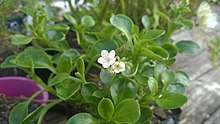Myosotis pansa subsp. pansa
Myosotis pansa subsp. pansa, also known as the Waitakere forget-me-not, is a subspecies of forget-me-not endemic to New Zealand.
| Myosotis pansa subsp. pansa | |
|---|---|
 | |
| Scientific classification | |
| Kingdom: | Plantae |
| Clade: | Tracheophytes |
| Clade: | Angiosperms |
| Clade: | Eudicots |
| Clade: | Asterids |
| Order: | Boraginales |
| Family: | Boraginaceae |
| Genus: | Myosotis |
| Species: | M. pansa (L.B.Moore) Meudt, Prebble, R.J.Stanley & Thorsen |
| Subspecies: | M. p. subsp. pansa |
| Trinomial name | |
| Myosotis pansa subsp. pansa | |
Description
Myosotis pansa subsp. pansa forms rosettes up to 200 mm across with flowering stems to 300 mm tall. Leaves are spoon-shaped, variable in size. The leaf blade is usually up to 35 mm long by 25 mm wide, covered with short stiff hairs that lie flat, with a petiole as long as the blade of the leaf. There are often several multi-flowered inflorescences per plant. Flowers are 10–15 mm in diameter, white with yellow scales around the throat.[2]
Distribution
The natural range of this subspecies is west coast of the North Island from Bethell's Beach west of Auckland to Ngarupupu Point, Waikato.[3] It is usually found with Celmisia major, the cliff daisy, and Myosotis pymaea in limited areas on the western coast of the Waitākere Ranges, as noted by Lucy Cranwell-Smith,1982, in her chapter on the Rain forest of the Waitakeres.[4] (A second subspecies, M. pansa subsp. praeceps is found in northern Taranaki.)[3] It usually grows close to the sea, within open forest or scrub, and more open habitats such as the base of cliffs.[5][6] It is also however well adapted to garden use with vibrant green foliage and well presented white flowers (which appear over a long period in summer).
Taxonomy
Myosotis pansa subsp. pansa L.B.Moore was originally described as a variety.[7] Based on morphological and genotyping evidence, it is now recognised as M. pansa (L.B.Moore) Meudt, Prebble, R.J.Stanley & Thorsen subsp. pansa.[3]
Cultivation
Myosotis pansa subsp. pansa grows in a similar manner to the classic garden forget-me-not, insofar as it is a short-lived perennial which self-seeds freely once established. It is, however, superior to its European relative as its foliage does not become bulky and scruffy in the way that M. sylvatica does at the end of a season.
Conservation status
The subspecies is listed as Threatened - Nationally Critical on the 2017 New Zealand Threatened Classification for plants.[1]
References
- Peter de Lange, Jeremy R. Rolfe, John W. Barkla, Shannel P. Courtney, Paul D. Champion, Leon R. Perrie, Sarah M. Beadel, Kerry A. Ford, Ilse Breitwieser, Ines Schönberger, Rowan Hindmarsh-Walls, Peter B. Heenan and Kate Ladley (2018). Conservation status of New Zealand indigenous vascular plants, 2017. OCLC 1041649797.CS1 maint: multiple names: authors list (link)
- "Forget Me Not (Myosotis petiolata var pansa)". Taranaki Educational Resource: Research, Analysis and Information Network. Retrieved 13 February 2014.
- Meudt, Heidi M.; Prebble, Jessica M.; Stanley, Rebecca J.; Thorsen, Michael J. (2013). "Morphological and amplified fragment length polymorphism (AFLP) data show that New Zealand endemic Myosotis petiolata (Boraginaceae) comprises three rare and threatened species". Australian Systematic Botany. 26 (3): 210. doi:10.1071/sb13023. ISSN 1030-1887.
- Waitakere Ranges : ranges of inspiration : nature, history, culture. Harvey, Bruce (Bruce James), 1931-, Harvey, Trixie, 1938-. Waitakere City, N.Z.: Waitakere Ranges Protection Society. 2006. p. 66. ISBN 978-0-476-00520-4. OCLC 70336135.CS1 maint: others (link)
- "Plant profiles > Myosotis". O2 Landscapes. Retrieved 13 February 2014.
- "Myosotis pansa subsp. pansa | New Zealand Plant Conservation Network". nzpcn.org.nz. Retrieved 2019-11-23.
- Allan, H. H. (Harry Howard), 1882-1957. (1982). Flora of New Zealand. Psilopsida, Lycopsida, Filicopsida, Gymnospermae, Dicotyledones. Government Printer. ISBN 0-477-01056-3. OCLC 760926043.CS1 maint: multiple names: authors list (link)
